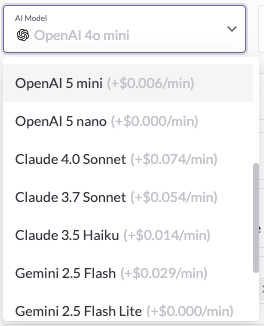LLM Models
Choose your LLM based on use case
Regal offers multiple leading Large Language Models (LLMs) to power your AI agents for phone and SMS conversations. Each is optimized for different use cases – so the best choice depends on your goals, call type, complexity of conversation, and cost tolerance.
We recommend starting with OpenAI GPT-4o Mini, Regal's default model. Then, progressively upgrade to higher-performing or more specialized models (e.g., GPT-4.1 Mini, GPT-4.1, GPT-4o, or the new GPT-5 series) only if you find that your AI agent isn’t performing the call as well as you’d like and you’re willing to pay more.

GPT-4o Mini
Best for short, simple cost-sensitive use cases
(e.g., calls normally staffed out of low-cost locales)
Examples:
- Confirmation
- Scheduling
- Collections calls
- Qualification calls with < 15 questions (and not much branching)
✅ Pros: Fastest model, cost-effective, great for straightforward tasks/conversations. Included in Regal base AI voice agent minute pricing
❌ Cons: Slightly weaker at reasoning; use a custom action for tasks like math
GPT-4.1 Mini
Best for short, simple conversations where strict task-instruction following is needed (improvisation not valued)
Examples:
- Confirmation
- Scheduling
- Collections calls
- Qualification calls with < 25 questions
✅ Pros: More reliable and consistent at following task instructions and function calling; updated knowledge through 2024
❌ Cons: Slightly worse at improvisation; slightly higher cost
GPT-4.1 / GPT-4o
Best for longer, more complex calls or those requiring math / reasoning
We've found GPT-4.1 better at following prompt instructions and function calling, while GPT-4o generates higher-quality, more natural conversation.
Examples:
- Long qualification calls with 10+ steps or conditional branches
- Open-ended support calls
- Calls with multiple or iterative custom actions
- Calls requiring complex reasoning (e.g., dynamic quote estimates)
✅ Pros: Handles conditional logic, multi-step functions, and nuanced dialogue better
❌ Cons: More expensive; adds slight latency
GPT-5 Series (New)
Best for advanced reasoning, memory retention, and multi-turn context
OpenAI’s latest GPT-5 models extend GPT-4o’s strengths with deeper reasoning, improved memory, and more human-like conversational flow.
- GPT-5 Nano: Ultra-lightweight, optimized for high-volume, low-cost interactions (e.g., confirmations, reminders)
- GPT-5 Mini: Balanced option for mixed workloads requiring stronger reasoning at moderate cost
- GPT-5: Full model, ideal for high-stakes or complex conversational tasks requiring domain knowledge, multi-step reasoning, and long-context recall
✅ Pros: Best-in-class reasoning and contextual memory; smoother voice response patterns
❌ Cons: More expensive
When to Consider Claude
If you’ve tried OpenAI GPT-4o Mini / 4.1 / 5 Mini and need stronger performance around memory, creativity, or nuanced language, consider Anthropic’s Claude series:
- Claude 3.5 Haiku: Fast, lightweight conversations
- Claude 3.7 Sonnet: Longer, more complex reasoning tasks
- Claude 4.0 Sonnet: Excels at subtle emotional understanding and creative synthesis
✅ Pros: Exceptional interpretability and safety; strong long-context memory
❌ Cons: Slightly slower response time and higher cost
When to Consider Gemini
Google’s Gemini series now includes the upgraded Gemini 2.0 and 2.5 lines:
- Gemini 2.0: Balanced model for mixed reasoning and creative tasks
- Gemini 2.5 Flash / Flash Lite: Optimized for ultra-low latency and low-cost deployments, ideal for voice agents needing fast turn-taking
✅ Pros: Excellent multimodal performance and web-connected reasoning
❌ Cons: Slightly less predictable function calling
Switching Between Models
When switching models, expect to make small prompt adjustments. For example, GPT-4o Mini may require more explicit phrasing, while GPT-5 or Claude 4.0 can infer intent more flexibly. Always test before full rollout.
Still not sure? Reach out – we’re happy to help tune your agent for best performance.
Want Regal to offer a different LLM? Just reach out – we’re constantly evaluating new models and onboarding those with differentiated performance.
Want to bring your own LLM? Contact us – we’ll help you integrate it into Regal.
Updated 3 months ago
